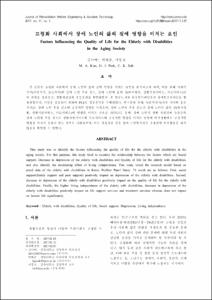KUMEL Repository
1. Journal Papers (연구논문)
1. School of Medicine (의과대학)
Dept. of Biomedical Engineering (의용공학과)
고령화 사회에서 장애 노인의 삶의 질에 영향을 미치는 요인
- Keimyung Author(s)
- Park, Hee Jun
- Department
- Dept. of Biomedical Engineering (의용공학과)
- Journal Title
- 재활복지공학회논문지
- Issued Date
- 2017
- Volume
- 11
- Issue
- 1
- Abstract
- This study was to identify the factors influencing the quality of life for the elderly with disabilities in the aging society. For this purpose, this study tried to examine the relationship between the factors which are Social support, Decrease in depression of the elderly with disabilities and Quality of life for the elderly with disabilities, and also identify the moderating effect of living independence. This study tested the research model based on panel data of the elderly with disabilities in Korea Welfare Panel Study. Th result are as follows: First, social support(family support and peer support) positively impact on depression of the elderly with disabilities. Second, decrease in depression of the elderly with disabilities positively impact on the quality of life for the elderly with disabilities. Finally, the higher living independence of the elderly with disabilities, decrease in depression of the elderly with disabilities positively impact on life support services and treatment services whereas does not impact on leisure life significantly.
본 논문은 고령화 사회에서 장애 노인의 삶의 질에 영향을 미치는 요인을 분석하고자 하며, 이를 위해 사회적 지지(가족지지, 동료지지)와 장애 노인 우울 감소, 장애 노인의 삶의 질(여가활동, 생활지원서비스, 치료서비스)간이 관계를 살펴보고, 생활자립성의 조절효과를 확인하였다. 본 연구는 9차 한국복지패널조사 장애인조사자료를 활용하였으며, 가설을 검증하기 위하여 PLS로 경로분석을 수행하였다. 연구결과 첫째, 사회적지지(가족 지지와 동료지지)는 장애 노인 우울 감소에 긍정적인 영향을 미쳤으며, 장애 노인의 우울 감소가 장애 노인의 삶의 질(여가생활, 생활지원서비스, 치료서비스)에 영향을 미치는 것으로 나타났다. 둘째, 장애 노인의 생활 자립성이 높을수록 장애 노인의 우울 감소는 생활지원서비스와 치료서비스에 긍정적인 영향을 미치는 반면에 여가생활에는 긍정적인 영향을 미치지 못하고 있는 것으로 나타났으며, 이는 자립성을 갖춘 장애 노인일지라도 우울하면 여가활동은 하지 않음을 확인할 수 있었다.
- Alternative Title
- Factors Influencing the Quality of Life for the Elderly with Disabilities in the Aging Society
- Keimyung Author(s)(Kor)
- 박희준
- Publisher
- School of Medicine
- Citation
- 김미애 et al. (2017). 고령화 사회에서 장애 노인의 삶의 질에 영향을 미치는 요인. 재활복지공학회논문지, 11(1), 37–44. doi: /10.21288/resko.2017.11.1.37
- Type
- Article
- ISSN
- 1976-7102
- Appears in Collections:
- 1. School of Medicine (의과대학) > Dept. of Biomedical Engineering (의용공학과)
- 파일 목록
-
-
Download
 oak-2017-0522.pdf
기타 데이터 / 487.29 kB / Adobe PDF
oak-2017-0522.pdf
기타 데이터 / 487.29 kB / Adobe PDF
-
Items in Repository are protected by copyright, with all rights reserved, unless otherwise indicated.